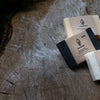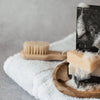Eco-Friendly Grooming: How Natural Soaps Support a Sustainable Lifestyle

In today's increasingly environmentally conscious world, men are revolutionising their grooming routines by embracing eco-friendly alternatives that benefit both their skin and the planet. Eco-friendly soap has emerged as a cornerstone of sustainable grooming, offering a powerful combination of natural ingredients, ethical production methods, and environmental responsibility.
This comprehensive guide explores how switching to natural, palm oil-free soaps like those crafted by Hiltwood can transform your daily routine while supporting a more sustainable lifestyle that aligns with modern environmental values.
The Rise of Sustainable Grooming in the UK
Shifting Consumer Consciousness
The UK men's grooming market, valued at £10.37 billion in 2023 and projected to grow at a remarkable 9.5% annually through 2030, is experiencing a fundamental transformation. British men are increasingly prioritising products that align with their environmental values, with 32% of UK men agreeing that natural or organic ingredients are important in grooming products. This shift represents more than a passing trend - it reflects a deeper understanding of how personal care choices impact both individual health and planetary wellbeing.
Over two-thirds of men aged 16-24 in the UK have adopted more eco-friendly grooming routines since 2020, demonstrating that younger generations are leading this sustainable revolution. This demographic shift is driving innovation in the industry, with brands responding by developing products that meet both performance expectations and environmental standards. The movement towards sustainable grooming practices represents a conscious decision to reduce one's ecological footprint whilst maintaining effective personal care routines.
Environmental Impact of Traditional Grooming Products
Traditional commercial grooming products contribute significantly to environmental degradation through multiple pathways. Plastic packaging alone accounts for approximately 1.7 billion items of waste thrown away weekly in the UK, with liquid soap bottles representing a substantial portion of this waste stream. These containers often end up in landfills or, worse, pollute marine environments where they can persist for hundreds of years.
The ingredients in conventional soaps pose additional environmental challenges. Synthetic detergents, phosphates, and chemical preservatives found in commercial products can contaminate waterways and disrupt aquatic ecosystems when washed down drains.
Many commercial soaps contain microplastics and synthetic compounds that resist biodegradation, accumulating in the environment and entering the food chain. This environmental burden has prompted environmentally conscious consumers to seek alternatives that offer effective cleansing without the ecological cost.
Understanding Eco-Friendly Soap: Beyond the Basics
Defining Natural Soap
Natural soap represents a return to traditional soap-making methods that prioritise plant-based ingredients and minimal chemical intervention. Unlike commercial detergent bars that rely on synthetic surfactants, natural soaps are created through saponification - a reaction between natural oils and an alkaline solution that produces genuine soap and glycerin. This time-tested process ensures that the resulting product is biodegradable and gentle on both skin and the environment.
True natural soaps, such as those handcrafted by Hiltwood, contain only ingredients that occur naturally or are derived directly from plants. This includes base oils like olive oil and coconut oil, natural butters such as shea butter, and essential oils for fragrance. The absence of synthetic additives, artificial fragrances, and chemical preservatives distinguishes natural soaps from their commercial counterparts, making them a superior choice for health-conscious consumers.
The Palm Oil-Free Advantage
Palm oil-free soap has become increasingly important as consumers recognise the devastating environmental impact of palm oil production. The palm oil industry remains one of the leading causes of deforestation globally, with Indonesia alone losing approximately 3 million hectares of old-growth forest to palm plantations over the past two decades. This deforestation contributes to climate change, habitat destruction, and the endangerment of species such as orangutans and tigers.
Hiltwood's commitment to palm oil-free formulations demonstrates environmental stewardship without compromising product quality. By utilising alternative plant-based oils such as olive oil, coconut oil, and sustainably sourced butters, these soaps deliver excellent cleansing and moisturising properties whilst supporting conservation efforts. Choosing palm oil-free products represents a direct action consumers can take to reduce their contribution to environmental destruction whilst enjoying superior skincare benefits.
Scientific Benefits of Natural Soap Ingredients
Skin-Nourishing Properties
The carefully selected ingredients in natural soaps provide measurable benefits for skin health and appearance. Olive oil, a cornerstone ingredient in many artisanal soaps, contains high levels of antioxidants, including vitamin E and polyphenols that protect skin from free radical damage. These compounds help maintain skin elasticity and promote cellular regeneration, contributing to healthier-looking skin over time.
Coconut oil offers natural antimicrobial properties whilst providing gentle cleansing action that doesn't strip the skin's natural protective barrier. Its molecular structure allows for deep penetration into skin layers, providing lasting hydration and supporting the skin's natural healing processes. The medium-chain fatty acids in coconut oil have been shown to have antimicrobial effects against common skin pathogens whilst remaining gentle enough for sensitive skin types.
Shea butter, frequently incorporated into premium natural soaps, contains significant concentrations of vitamins A and E alongside natural cinnamic acid esters that provide mild sun protection. The anti-inflammatory properties of shea butter make it particularly beneficial for men with sensitive skin or those experiencing irritation from shaving. These natural ingredients work synergistically to provide comprehensive skin care benefits that synthetic alternatives cannot replicate.
Glycerin: Nature's Moisturiser
One of the most significant advantages of handmade natural soap lies in its glycerin content. Glycerin is a natural humectant produced during the saponification process that draws moisture from the air and helps maintain skin hydration. Commercial soap manufacturers typically remove glycerin to sell separately for use in more profitable products, leaving their soaps with drying properties that can damage the skin's natural moisture barrier.
Hiltwood's handmade soaps retain all naturally occurring glycerin, ensuring that each use provides moisturising benefits rather than the tightness and dryness associated with commercial soaps. This natural moisturising action is particularly beneficial for men who shave regularly, as it helps soothe and protect skin from razor irritation whilst maintaining optimal hydration levels throughout the day.
Environmental Advantages of Eco-Friendly Soap
Biodegradability and Water System Protection
The biodegradable nature of natural soaps represents a crucial environmental advantage over synthetic alternatives. When natural soap enters water systems through drainage, it breaks down completely within days without leaving harmful residues. This rapid decomposition means that natural soaps do not accumulate in aquatic environments or contribute to the pollution of rivers, lakes, and marine ecosystems.
In contrast, synthetic detergents and commercial soap formulations can persist in water systems for extended periods, potentially disrupting aquatic life and contributing to algae blooms that deplete oxygen levels. The phosphates commonly found in commercial soaps are particularly problematic, as they act as fertilisers in water bodies and can trigger eutrophication processes that damage entire aquatic ecosystems.
Reduced Carbon Footprint
The production and distribution of natural, handmade soaps typically generate significantly lower carbon emissions compared to mass-produced alternatives. Small-batch production methods require less energy-intensive processing, while the concentration of soap bars eliminates the need for water-heavy formulations that increase transportation weights and packaging requirements.
Hiltwood's UK-based production facility ensures that their soaps have minimal transportation-related emissions for British consumers, further reducing the environmental impact of choosing their products. The elimination of plastic packaging in favour of minimal, recyclable materials represents an additional carbon footprint reduction that environmentally conscious consumers can appreciate.
Plastic Waste Reduction
Switching from liquid soap in plastic bottles to solid soap bars represents one of the most immediate environmental benefits consumers can achieve. A single bar of quality natural soap typically replaces multiple plastic bottles of liquid soap, representing a dramatic reduction in plastic waste generation. Studies indicate that soap bars can last 4-6 weeks with regular use, meaning that a few bars per year can replace dozens of plastic containers.
The packaging for natural soap bars, such as Hiltwood's minimal wrapping approach, further reduces plastic waste whilst maintaining product integrity and freshness. This packaging philosophy demonstrates that effective product protection doesn't require excessive materials or non-recyclable components.
Actionable Tips for Sustainable Grooming
Making the Transition
Transitioning to eco-friendly soap requires understanding how to maximise the benefits of natural ingredients while adapting grooming routines for optimal results. Start by replacing one conventional product at a time, beginning with your daily body soap, which represents the largest volume of use and therefore the most significant environmental impact. This gradual approach allows your skin to adjust to natural ingredients while providing time to evaluate the performance and benefits of each product.
When first using natural soap, expect a different lathering experience compared to commercial alternatives. Natural soaps produce a creamier, less voluminous lather due to the absence of synthetic foaming agents. This difference doesn't indicate reduced cleaning effectiveness - natural soaps clean thoroughly through the action of actual soap molecules rather than harsh detergents that strip skin of natural oils.
Proper Storage and Care
Maximising the lifespan of natural soap bars requires proper storage techniques that prevent premature softening and waste. Use a well-draining soap dish that allows air circulation around the bar, preventing it from sitting in water between uses. This simple step can double the lifespan of a natural soap bar whilst maintaining its effectiveness and pleasant texture.
Consider rotating between multiple bars to allow each to dry completely between uses, particularly in humid bathroom environments. Store unused bars in a cool, dry location away from direct sunlight to preserve their natural fragrances and beneficial properties. These practices ensure that you achieve maximum value from premium natural soaps while maintaining their quality throughout use.
Building a Complete Sustainable Routine
Extend the benefits of eco-friendly soap by incorporating complementary sustainable grooming practices. Replace disposable razors with high-quality safety razors that use recyclable steel blades, reducing plastic waste whilst often providing a superior shaving experience. Choose natural, plastic-free shaving brushes made from sustainable materials to complete your sustainable shaving setup.
Consider multi-purpose products that reduce the total number of items in your grooming routine. High-quality natural soaps like those from Hiltwood are suitable for both face and body use, eliminating the need for separate products while ensuring consistent, natural care for all skin areas. This approach simplifies your routine whilst maximising environmental benefits and often reducing overall costs.
Frequently Asked Questions
What makes soap truly "eco-friendly"?
Eco-friendly soap is characterised by biodegradable natural ingredients, minimal environmental impact during production, sustainable sourcing practices, and plastic-free packaging. True eco-friendly soaps contain no synthetic detergents, artificial preservatives, or palm oil derivatives that contribute to environmental degradation.
How long do natural soap bars typically last?
A well-made natural soap bar typically lasts 4-6 weeks with regular daily use, though this can extend significantly with proper storage and care. The longevity depends on factors such as bar size, ingredient composition, storage conditions, and usage patterns.
Are natural soaps suitable for sensitive skin?
Natural soaps are generally superior for sensitive skin due to their gentle, chemical-free formulations and retained glycerin content. The absence of synthetic fragrances, harsh detergents, and artificial preservatives reduces the likelihood of skin irritation or allergic reactions.
Can natural soap effectively remove dirt and bacteria?
Natural soap is highly effective at removing dirt, oil, and bacteria through the cleansing action of soap molecules created during saponification. Studies confirm that bar soaps are equally effective as antibacterial liquid soaps for eliminating germs whilst being gentler on skin.
How should I store natural soap to maximise its lifespan?
Store natural soap on a well-draining soap dish that allows air circulation, keeping it dry between uses. Rotate between multiple bars if possible, and store unused bars in cool, dry locations away from direct sunlight to preserve their beneficial properties.
Why avoid palm oil in soap products?
Palm oil production is a leading cause of deforestation, particularly in Indonesia and Malaysia, contributing to climate change and species endangerment. Choosing palm oil-free alternatives supports conservation efforts whilst often providing superior moisturising properties through alternative plant oils.
What's the difference between natural soap and commercial soap?
Natural soap is made through traditional saponification using plant-based oils and retains beneficial glycerin, whilst commercial soap often contains synthetic detergents, artificial additives, and has glycerin removed. This results in natural soap being more moisturising and environmentally friendly.
Making the Sustainable Choice
The transition to eco-friendly soap represents more than a simple product substitution - it embodies a commitment to environmental stewardship and personal health that extends far beyond the bathroom. By choosing natural, palm oil-free soaps like those crafted by Hiltwood, men can significantly reduce their environmental impact whilst enjoying superior grooming experiences that nourish and protect their skin.
The convergence of environmental consciousness and grooming effectiveness demonstrates that sustainable choices need not involve compromises. Natural ingredients provide demonstrable benefits for skin health, whilst biodegradable formulations protect aquatic ecosystems. Local production supports community economies whilst reducing transportation emissions. This alignment of personal and planetary benefits makes the choice of eco-friendly grooming products both logical and rewarding.
As the UK men's grooming market continues its rapid growth trajectory, the emphasis on sustainability and natural ingredients will only intensify. Early adopters of eco-friendly grooming practices position themselves at the forefront of this movement whilst establishing habits that contribute to long-term environmental protection and personal wellbeing.
The evidence overwhelmingly supports the superiority of natural, handmade soaps over their commercial counterparts across multiple dimensions: environmental impact, skin health benefits, ingredient quality, and even economic value when considered over time. Hiltwood's commitment to excellence in all these areas makes them an ideal partner for men seeking to elevate their grooming routine whilst supporting sustainable practices.
-
Posted in
eco-friendly soap




